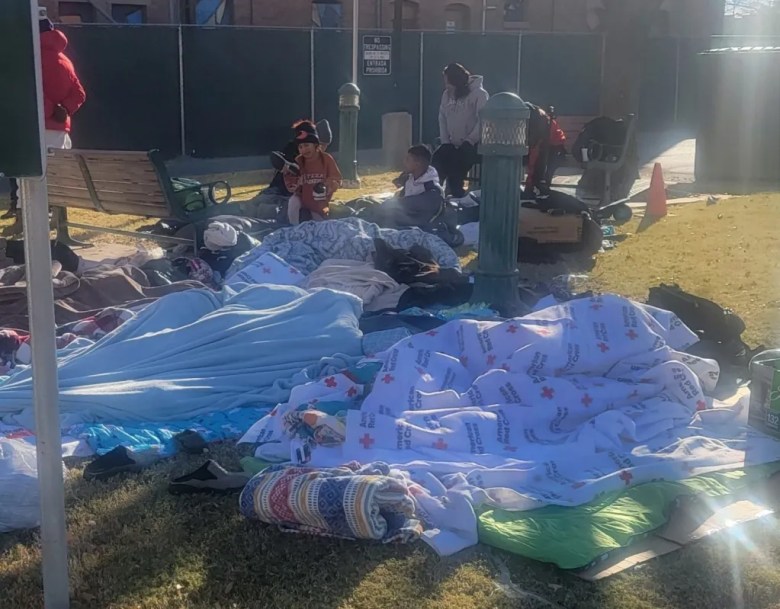From above the bank of the Rio Grande in Juárez, Jonaiker watched below as a woman carried a young girl across the river, stepping carefully through the shallow water.
Armed soldiers from the Texas National Guard waited for her on the other side, standing behind the fanged curls of recently erected concertina wire.
Jonaiker, who declined to give his last name, planned to cross too, he said, his face partially obscured by the brown fuzzy blanket wrapped around him.
He hoped to make his way to Chicago, where his brother has been living for a few months now. But Jonaiker was among the Venezuelans who missed their opportunity to enter the United States and legally seek asylum. For a while, Venezuelans were exempt from Title 42, the public health policy allowing the U.S. to expel migrants, because Venezuela does not accept expulsion flights.
Then on Oct. 12, the U.S. Department of Homeland Security said that it would expel Venezuelan migrants to Mexico – denying them their right to request asylum. Like others that morning, Jonaiker had marked Wednesday, Dec. 21, as the day Title 42 was supposed to end. But a few days prior, the Supreme Court temporarily extended the policy.
“If not now, then when?” Jonaiker asked Wednesday morning with a tinge of bitterness. He can’t return home to a country that doesn’t want him.

Moments later, he walked down to the river bank with another man who’s wrapped in a blue blanket. They headed east toward the sunrise, past colorful graffiti and scattered groups of people burning what items they could go without – a backpack here, a hoodie there – to keep their fires going.
The two men disappeared among the throng of people near the Stanton Street international bridge, where by 8 a.m. a long line formed, migrants waiting for border enforcement to start processing them.
For many migrants like Jonaiker waiting to seek asylum, the news of Title 42 being extended hit hard.
But the policy’s extension also bought time for border cities like El Paso to better prepare to help feed, shelter and transport the thousands of migrants they expected to receive.
Even with Title 42 in place, local governments and nongovernmental organizations have been working overtime to accommodate as many migrants as will fit in each and every corner of their shelters — and to find new spaces to house more.

It hasn’t been enough – although the city opened the Judson F. Williams Convention Center next to the Greyhound Bus Station on Wednesday evening in hopes of preventing migrants from sleeping on the streets. The city is also preparing two schools to shelter migrants.
As the evening chill hit late Wednesday, staff with the El Paso Office of Emergency Management escorted migrants — many of them families with children — from the streets near the bus station to the convention center two blocks away for the night.
The scene at night felt different from the early morning, when migrants welcomed the warm sun that hit their faces. They had spent the night sleeping on cardboard along sidewalks in 34-degree weather, huddling under blankets donated by kind passers-by.
“Estuvo fuerte, feo, el frio,” Gonzalo, of Ecuador, said in Spanish as he took a puff from a cigarette and passed it to one of his newfound friends. “The cold was difficult, ugly. But now it’s a new day and we hope we can get to New York.”

Gonzalo stood at the corner of Chihuahua and Overland streets, surrounded by more than 100 others who were hoping to find shelter before the next cold night arrived.
Behind him, children played with donated Barbie dolls, Spiderman masks and Hot Wheels cars. National TV news crews reported from the area, delighting the young migrants who were awed by the cameras and lights.
Ruben Garica, the founder and executive director of the Annunciation House network of migrant shelters, was among those being interviewed. He spoke to El Paso Matters briefly prior to his TV appearance, saying one message he hoped to get across was that the vast majority of migrants do not come into the country with bad intentions.
“Some things that are very telling is that they want to get working very urgently,” Garcia said. “They’re saying, ‘I don’t want you to take care of me. I didn’t come for you to take care of me. I came to get away from what’s going on in my country. I want to get busy working and taking care of my family.”

At the Rescue Mission of El Paso, about 230 migrants – including 20 children – slept in a space for 190.
“This has been overwhelming,” said Nicole Reulet, the nonprofit’s director of marketing as she stood in the lobby of the mission on Lee Street in South Central El Paso.
“The migrants have been great,” she said, the lobby overflowing with bags of donated clothes and blankets. “Some Americans’ reaction to them is based on fear, but they need to know that the migrants are here out of desperation and not out of entitlement.”

Back on Chihuahua street, a 67-year-old man from Venezuela stood with Gonzalo, talking about Title 42 and how countless migrants are disappointed it’s still in place.
Admitting he crossed into the United States illegally, the man didn’t provide his name in fear of being identified and deported. He said he was unsure of his next move, but hoped to get to New York City and find a job under the radar of immigration officials.
It’s a risk he’s willing to take.
“I’m old and hungry and Venezuela has absolutely nothing for me,” he said. “I can still work, that I can do. But there’s no work in Venezuela, no future. Here, there’s work – and hope.”
El Paso Matters reporter Daniel Perez contributed to this report.




